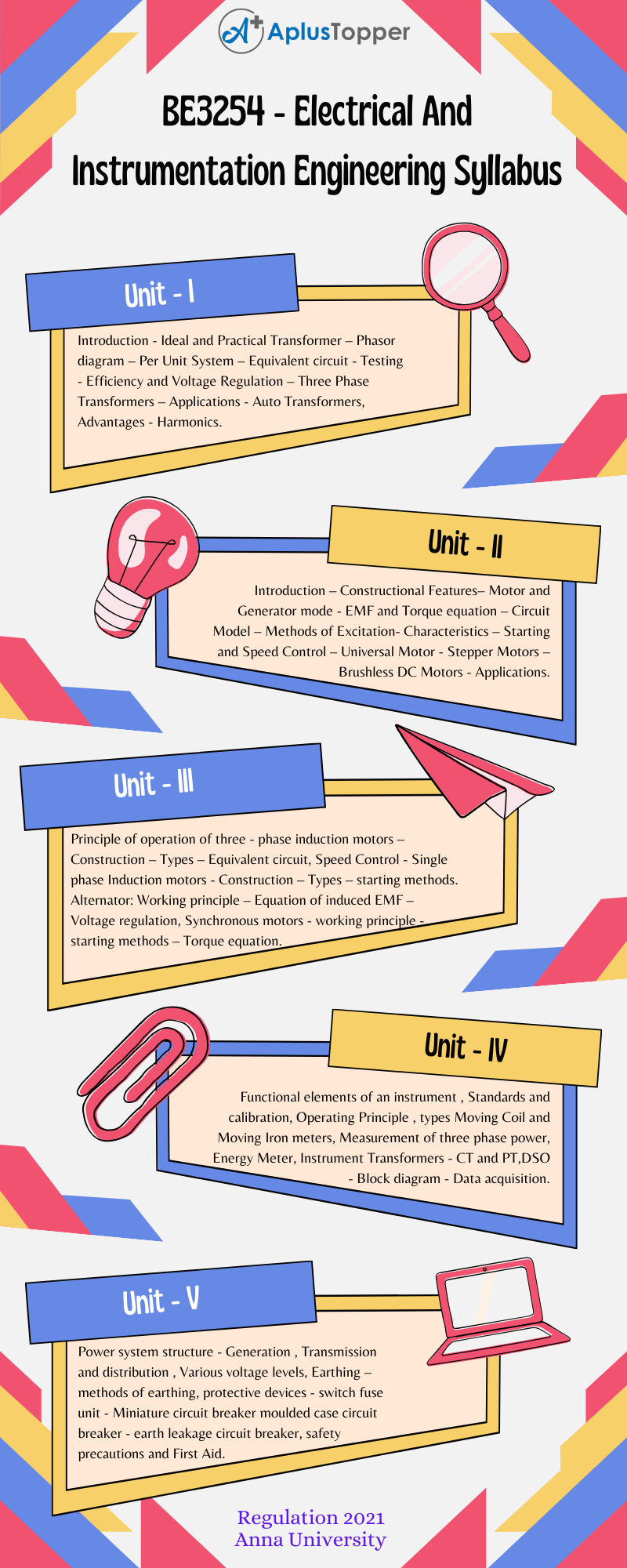Code BE3254 deals with the subject from the Anna University Regulation 2021, related to affiliated institutions, syllabus of B.E Electronics and Telecommunication Engineering. In this article, we discuss the Electrical And Instrumentation Engineering Syllabus.
We intend to provide the syllabus of BE3254 – Electrical And Instrumentation Engineering, we include the textbooks and references from the faculty of experts. You can get the required information unit-wise. The following links will help you to get proper information. I hope you can find the details in the article given below.
If you want to know more about the syllabus of B.E Computer Science and Engineering (Cyber security) Syllabus connected to an affiliated institution’s four-year undergraduate degree program. We provide you with a detailed Year-wise, semester-wise, and Subject-wise syllabus in the following link B.E Electronics and Telecommunication Engineering Syllabus Anna University, Regulation 2021.
Aim of Objectives:
- To impart knowledge in types, construction and working of transformers.
- To impart knowledge in types, construction and working of DC machines.
- To impart knowledge in types, construction and working of AC rotating machines.
- To introduce the functional elements and working of measuring instruments.
- To introduce the basics of power systems and protection schemes.
BE3254 – Electrical And Instrumentation Engineering Syllabus
Unit I: Transformer
Introduction – Ideal and Practical Transformer – Phasor diagram – Per Unit System – Equivalent circuit – Testing – Efficiency and Voltage Regulation – Three Phase Transformers – Applications – Auto Transformers, Advantages – Harmonics.
Unit II: DC Machines
Introduction – Constructional Features– Motor and Generator mode – EMF and Torque equation – Circuit Model – Methods of Excitation- Characteristics – Starting and Speed Control – Universal Motor – Stepper Motors – Brushless DC Motors – Applications.

Unit III: Ac Rotating Machines
Principle of operation of three-phase induction motors – Construction – Types – Equivalent circuit, Speed Control – Single phase Induction motors – Construction – Types – starting methods. Alternator: Working principle – Equation of induced EMF – Voltage regulation, Synchronous motors – working principle – starting methods – Torque equation.
Unit IV: Measurements And Instrumentation
Functional elements of an instrument, Standards and calibration, Operating Principle, types of Moving Coil and Moving Iron meters, Measurement of three-phase power, Energy Meter, Instrument Transformers – CT and PT, DSO – Block diagram – Data acquisition.
Unit V: Basics Of Power Systems
Power system structure – Generation, Transmission and distribution, Various voltage levels, Earthing – methods of earthing, protective devices – switch fuse unit – Miniature circuit breaker moulded case circuit breaker – earth leakage circuit breaker, safety precautions and First Aid.
Text Books:
- Kothari DP and I.J Nagrath, “Basic Electrical and Electronics Engineering”, Second Edition, McGraw Hill Education, 2020.
- S. K, Bhattacharya, “Basic Electrical and Electronics Engineering”, Second Edition, Pearson Education, 2017.
- A.K. Sawhney, Puneet Sawhney ‘A Course in Electrical & Electronic Measurements & Instrumentation’, Dhanpat Rai and Co, New Delhi, 2015.
- C.L.Wadhwa, “Generation, Distribution and Utilisation of Electrical Energy”, New Age International Pvt.ltd.,2003.
References:
- Kothari DP and I.J Nagrath, “Basic Electrical Engineering”, Fourth Edition, McGraw Hill Education, 2019.
- Mahmood Nahvi and Joseph A. Edminister, “Electric Circuits”, Schaum’ Outline Series, McGraw Hill, 2002.
- H.S. Kalsi, ‘Electronic Instrumentation’, Tata McGraw-Hill, New Delhi, 2010.
Related Posts on Semester – II:
- HS3252 Professional English – II
- MA3251 Statistics and Numerical Methods
- PH3254 Physics for Electronics Engineering
- GE3251 Engineering Graphics
- GE3252 தமிரு் ததொழி்நு்பமு் /Tamils and Technology
